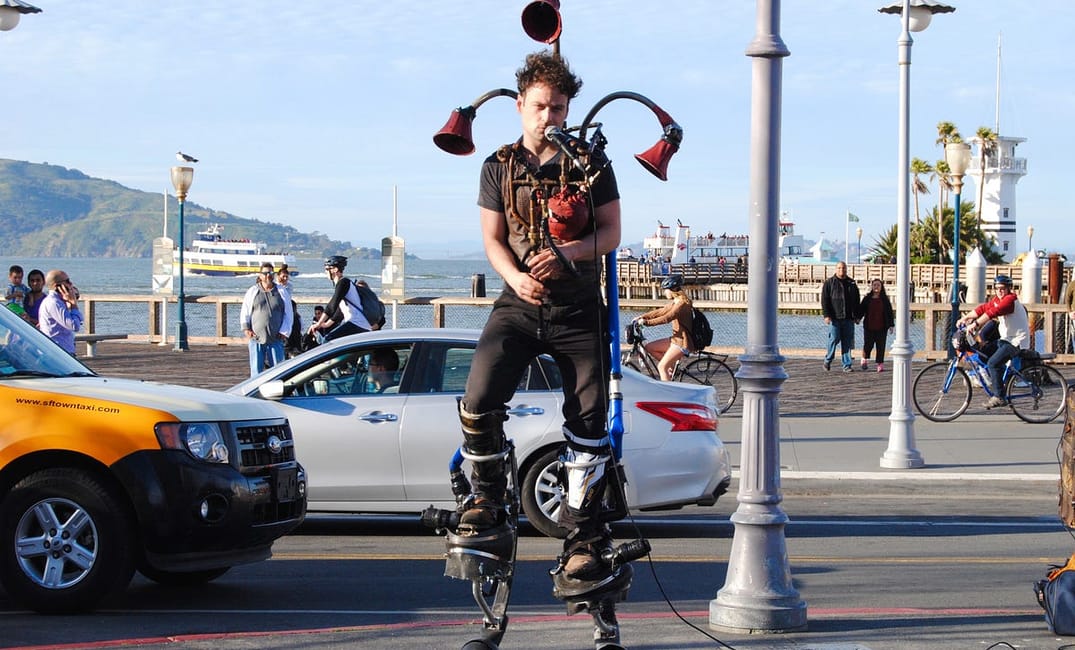
“I like how the Japanese describe us,” he says of street performers. “Heaven Artists — as if we’re not searching for anything because we’re already there.” That’s Jamus Pajamas, a street musician originally from Nova Scotia who has spent the last 17 years of his life travelling the world and playing hybrid pieces featuring the bagpipes and beatboxing.
Many street artists are referred to as “buskers,” a name originally derived from the Spanish word “buscar,” meaning “to seek.” For 31-year-old Pajamas, originally born Jamus McDonald, his goals are neither fame nor fortune but rather to simply test the limits of his self-invented instrument, the Heartpipes, and redefine what it means to be a one-man band.
“I’m the only one in the world doing this, which makes me both the best and the worst at it.”
Jamus was introduced to the bagpipes at a young age. He grew up in Antigonish, Nova Scotia, a place whose name means “something about bears, beech nuts and the intersection of rivers,” he says, laughing. Having often listened to his mother play, Jamus quickly became one of 30 students in a class of 60 taking lessons from the local music instructor. He describes his hometown as a place rich with Scottish heritage and a tight-knit community. His hometown featured whisky-throwing traditions and a refurbished ship where tourists could learn all about the original Scottish immigration.
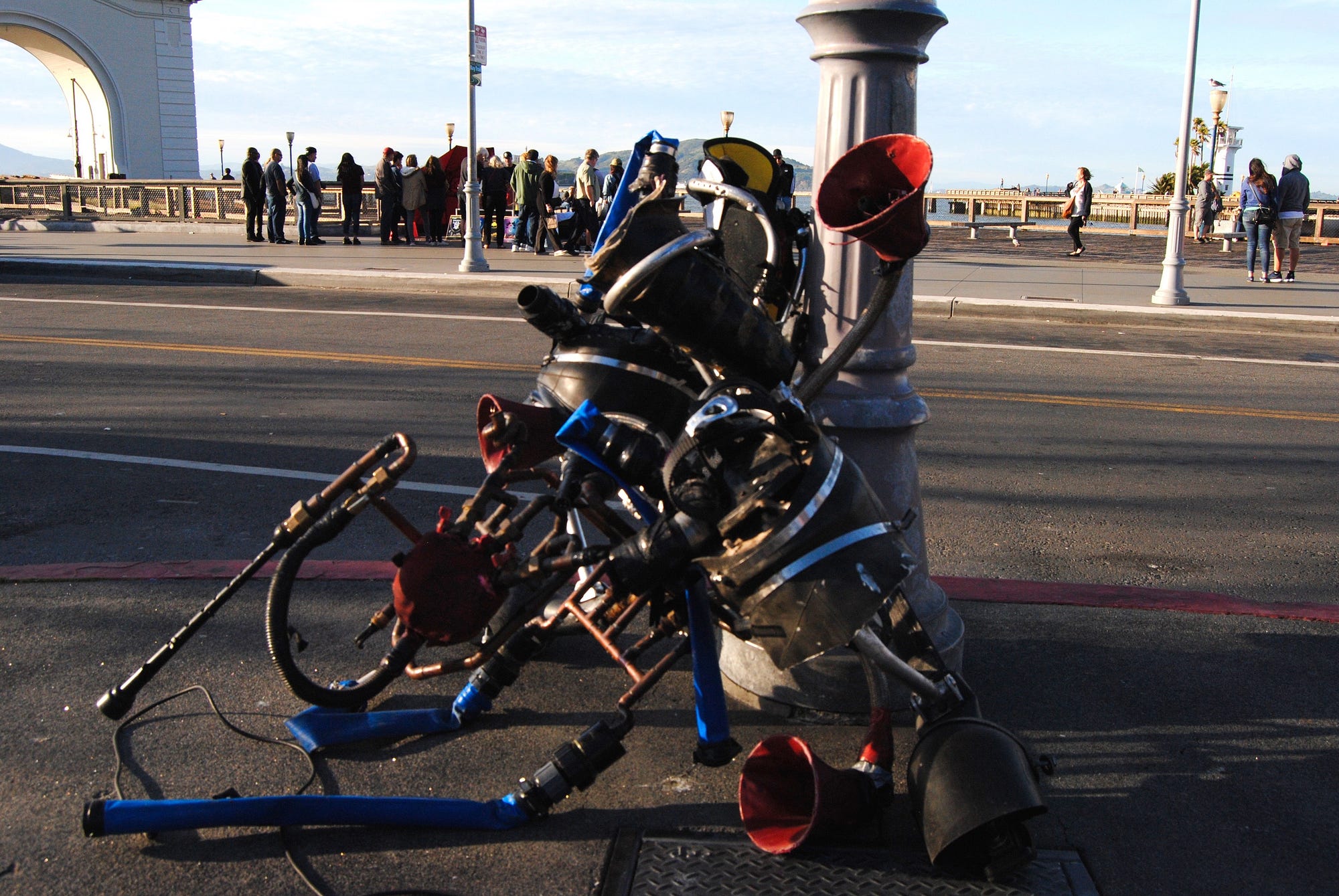
“Beach parties and concerts in the woods — those were my teen years,” Jamus says. He has always had an entrepreneurial spirit with a rebel-creative flare. In Nova Scotia, he threw rock concerts on stages built from crude lumber, and at the age of 19, he left home with 300 dollars, a bit of performance experience and a taste for adventure. The first stop on his Euro tour with friends lasted longer than expected. While the group continued on to Italy and other countries, Jamus stayed in Scotland for five months, sleeping on the famous mountain known as Arthur’s Seat and journeying down onto High Street to perform for tourists in front of Edinburgh Castle.
“People seemed to really like the music,” he remembers, “but they were also surprised by it.” Because he learned the pipes in Nova Scotia, his playful take on tradition began early, leaving behind the formal and militarized styles Scottish audiences were used to. “The best way to describe it,” he notes, “is that traditional Scottish playing is a consistent beat. [At home] the music has a different pulse — more of a cut and dash — cutting one beat and adding it to another.”
One afternoon on High Street, his playing took a new turn. He was distracted from his performance by a strong cadence, and he decided to follow the sound to its source. Two African drummers performed a contagious rhythm, with little acknowledgement from the crowds. In 2005, the Scottish were “people were beginning to question immigration,” Jamus notes. The 31st G8 summit had just taken place in Auchterarder, Scotland, and “the question was out there—is this a good or bad thing to have these [foreigners] here?”
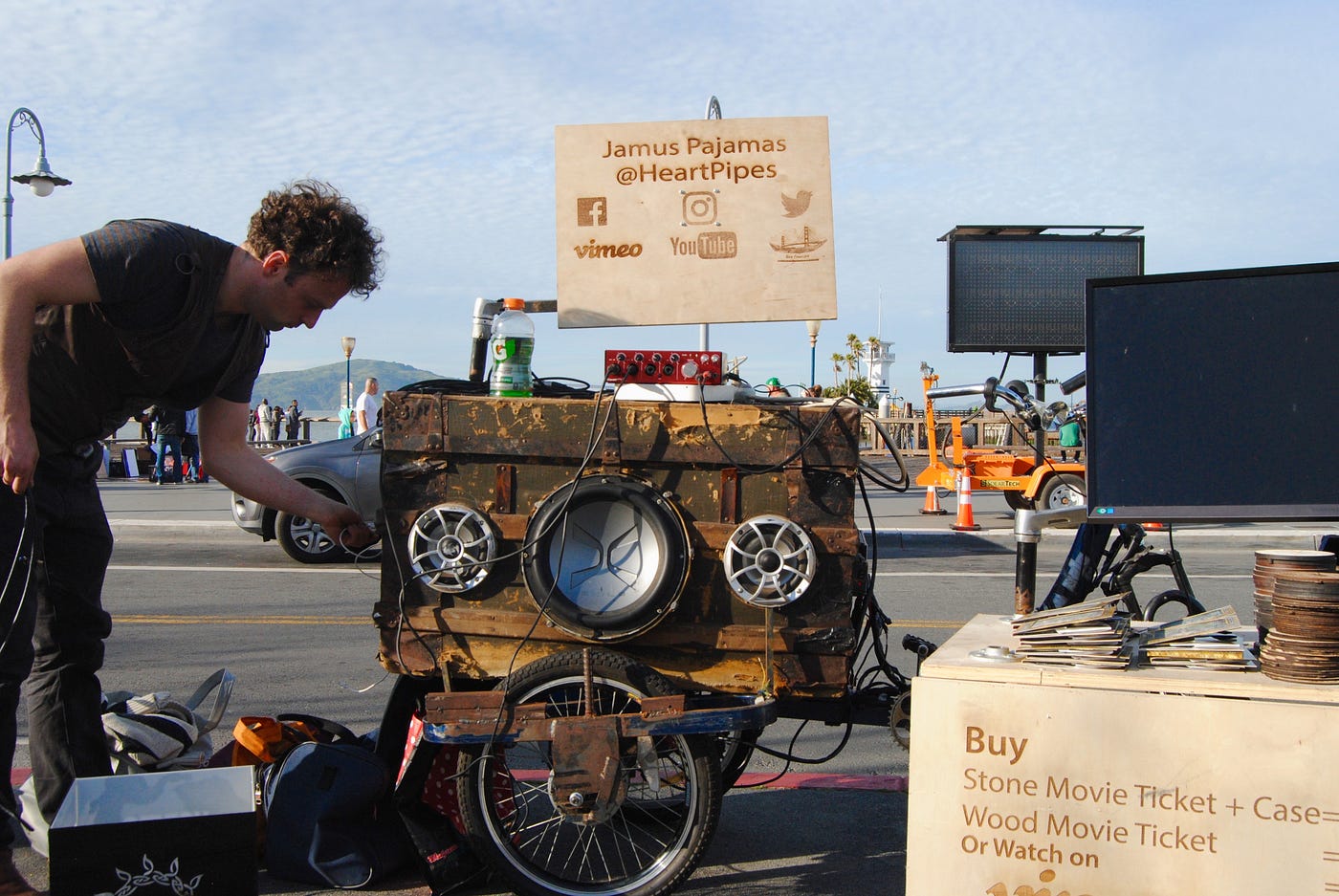
The drummers at first rejected Jamus’s request to join. Sammy, a 30-year-old Nigerian, responded to 19-year-old Jamus with a simple “nah” after eyeing his bagpipe. But Tumi, a 27-year-old Tanzanian, insisted on giving him a chance. Jamus recalls the magic in the moments that followed. “It was as if the city had stopped. Like a bomb went off — but in a good way,” he says. People began cracking beers open in the street and staying to watch the three of them take down the city.
After playing and living with Sammy and Tumi for a number of months, Jamus returned home. He was unable to continue his university studies in business after Tumi ran off with the group’s savings. Jamus had to find work. He joined the Athabasca Oil Sands of Alberta, Canada, and spent the next seven winters working onshore in one of the harshest and most dangerous jobs in the world. But it wasn’t all bad. Inspired by his time with Sammy and Tumi, Jamus began tossing around the idea of learning how to beatbox in an attempt to ever improve upon his one-man performance. Between shifts with off-season UFC fighters in the tar-scented industrial city, he beatboxed for 12 hours every day, sometimes with inches of ice attached to his uniform.
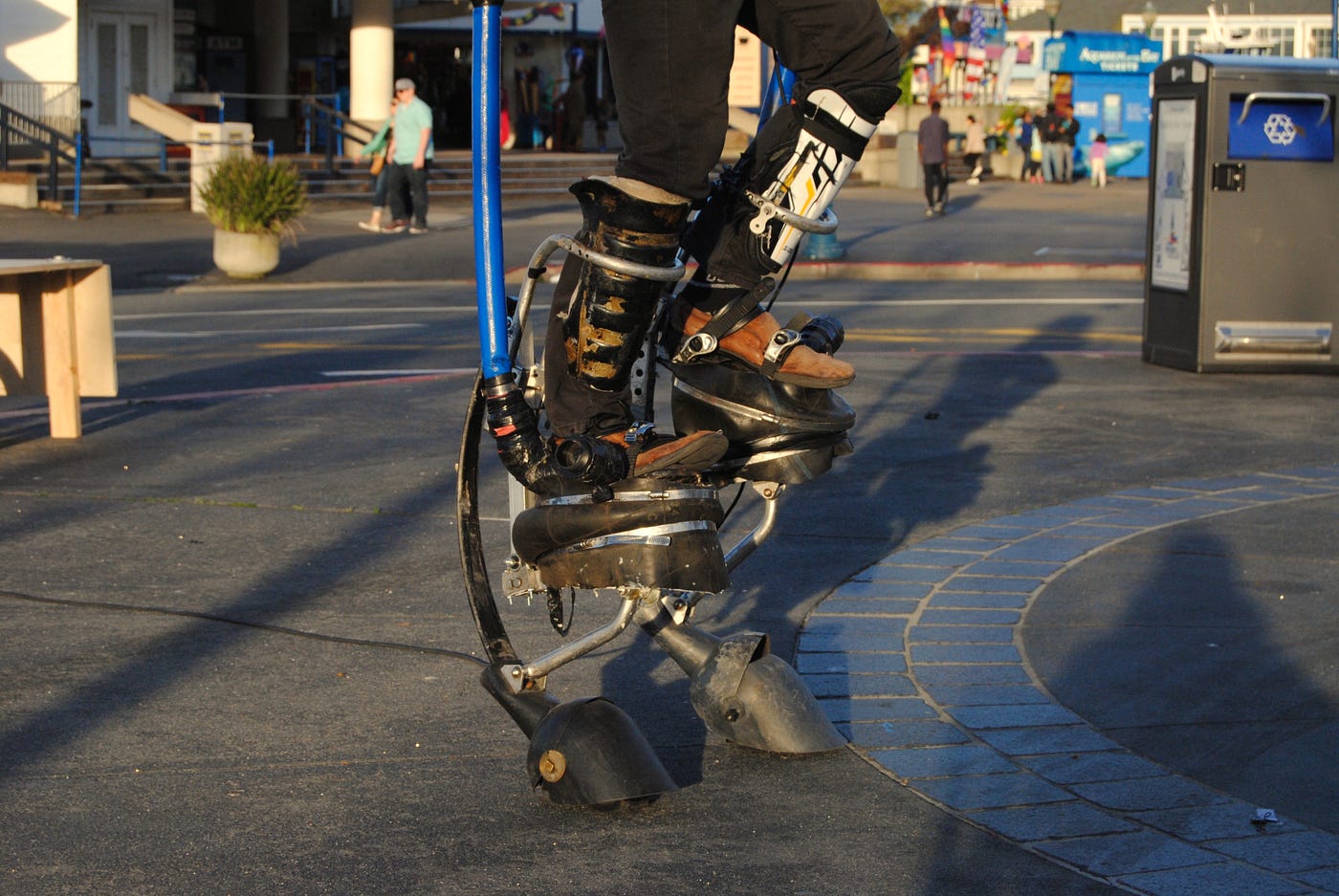
I first met Jamus at the Yerba Buena Gardens off of Market Street when I was walking by and heard the familiar notes of “Amazing Grace” floating past. Something about the song was off, though, despite its familiarity. A new beat was emerging from the historic melody. I saw Jamus on what looked to be stilts, beatboxing into a mic and somehow also playing the bagpipes.
“The Heartpipes are my invention,” he explained to the gathering crowd after the song. “I’m the only one in the world doing this, which makes me both the best and the worst at it,” he said. Smiles peeked out from behind iPhones as tourists snapped photos. He showed the audience how his instrument worked: he propels air into the heart of the pipe (which is red and shaped like a heart) with steps from his feet into tubes crafted out of “toilet parts.” His performance style was very steampunk. He cycles his gear through the streets in a wooden trunk (which also doubles as a speaker system) and dresses in variations of stilted mythical characters, complete with leather vests and faux hooves.
Jamus hopes to modify the structure of his Heartpipes and experiment with the way its shape relates to space and the human body. He’s fascinated by the idea of changing mechanical properties to alter sound and using sound to express a physical shape in space — a concept that, he says, has the potential to be used beyond music — for individuals with various sensory disabilities.
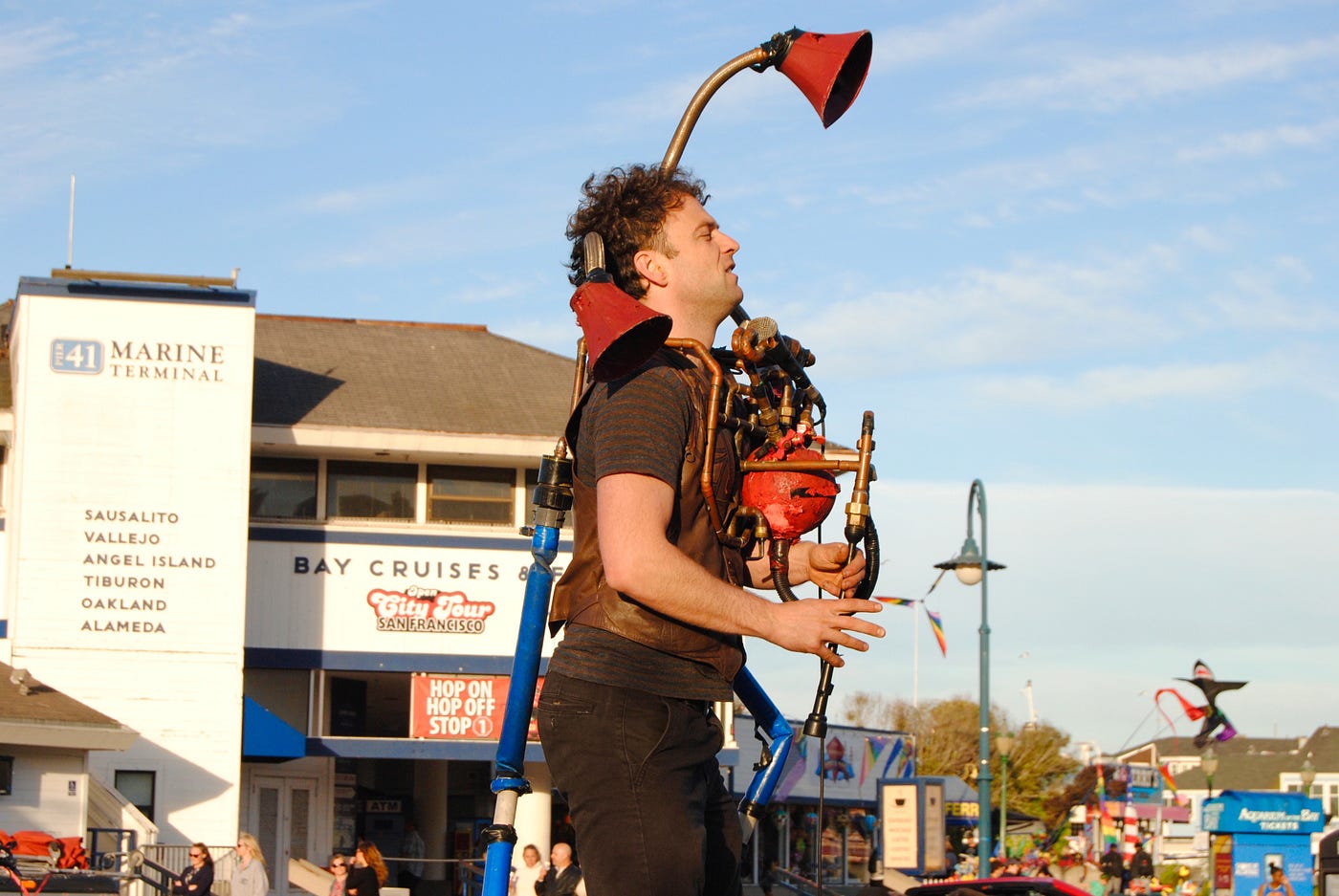
On St. Patrick’s Day, I went to watch Jamus perform at Fisherman’s Wharf in a location the local busking community calls “Spot One.” In an island in the middle of traffic, tourists walk in both directions, pointing at attractions on either side. Some hold ice cream and expensive cameras, while others juggle small children and lofty sightseeing plans. That day, green-clad groups and families paused to listen to Jamus explain his music. He joked, “When I do this, it sounds like a dying cat.” An older woman was moved nearly to tears after his rendition of a classic song improvised with beats. A young girl walked up to the donation box and dropped in a few bills, then ran away in green leggings with braids bouncing after her. The crowds stopped in spite of themselves. They were enchanted, as I was, at the sound of the pipes — once reserved for the green moors of islands and now being played past lines of palm trees, over tour buses and under trolley cars.
What is it about the bagpipes that draws people out, captivating even the biggest skeptic?
The wind picked up and the sun set, reaching each segment of the Heartpipes in descending steps. It was nearly 7:00 p.m., and his time in Spot One was almost over. Faces drenched in late mid-March gold caught the last few bars of his song. Without pretense, Jamus thanked the audience, wished them a happy St. Patrick’s Day and stepped off his stilts.
Correction (4/7/2017): Jamus’s age is 31, not 35.
Jamus Pajamas is world-traveling bagpipe and beatbox artist currently playing on the streets of San Francisco. A short film about his travels and music was released in March 2017.



